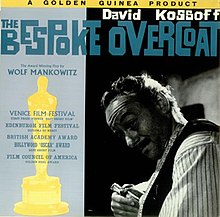The Bespoke Overcoat
| The Bespoke Overcoat | |
|---|---|
 Film poster | |
| Directed by | Jack Clayton |
| Written by | Nikolai Gogol Wolf Mankowitz |
| Produced by | George K. Arthur Jack Clayton |
| Starring | Alfie Bass David Kossoff |
| Cinematography | Wolfgang Suschitzky |
| Edited by | Stan Hawkes |
Production company | |
| Distributed by | British Lion Films |
Release date |
|
Running time | 33 minutes |
| Country | United Kingdom |
| Language | English |
| Budget | £5,000[1] |
The Bespoke Overcoat is a 1956 British black and white short film directed by Jack Clayton, based on a 1953 play of the same name by Wolf Mankowitz. The story is an adaptation of Nikolai Gogol's short story The Overcoat with the action moved from Russia to the East End of London. In this version the protagonists are poor Jews working in the clothing trade, played by Alfie Bass and David Kossoff. It won an Oscar at the 29th Academy Awards in 1957 for Best Short Subject (Two-Reel).[2][3]
Plot
[edit]The film titles run as a funeral takes place. A coffin is placed in the grave. We then see an overcoat being thrown on the coffin, before the grave is infilled. Morrie a Jewish tailor, speaks to himself in the mirror. He is then joined by the dead Fender. They debate the art of tailoring.
Fender is a lowly clerk in the warehouse of clothing manufacturers Ranting and Co. He complains to his boss, Mr Ranting that it is cold, and he wishes he had a good coat. Ranting ridicules him and says he will never be able to afford £20 for a good coat. He goes to a tailor friend, Morrie, to make a bespoke overcoat. They discuss the materials and the cost, which is agreed at £10.
As the coat progresses he goes for a fitting. The coat has no arms, and looks very big, but he says it is too tight under the arms. They agree that Fender will pay £2 at this stage. Ranting fires Fender. He goes to Morrie. They drink brandy by candlelight and Fender cries as he says he must cancel the order. Morrie says he will finish the coat nevertheless.
Fender lies in bed and regrets not fighting for his job, or fighting for a sheepskin coat. He coughs and coughs. He dies in his sleep. His ghost speaks to Morrie, who gives him the completed coat. However he still wants a sheepskin coat from Ranting's warehouse. The pair drink more brandy and go to the warehouse. Morrie asks if he can walk through the wall but Fender wishes to use the door.[4]
They enter and find a rail of jackets. They agree Morrie's work is better but "Ranting owes me" he says. Fender wishes Morrie a long life and says "pray for me", as he slowly walks away into eternity. Back at his house, Morrie puts on a black skullcap and says a Jewish prayer.
Cast
[edit]- Alfie Bass as Fender (Ghost)
- David Kossoff as Morrie
- Alan Tilvern as Ranting
- Alf Dean as Gravedigger (uncredited)
Reception
[edit]Pauline Kael called The Bespoke Overcoat "one of the best short-story films ever made".[5]
Stage play
[edit]The play was performed at the Arts Theatre in London with Kossoff and Bass and was directed by Alec Clunes. The supporting cast was Harold Kasket and Oscar Quitak.[6]
References
[edit]- ^ Alexander Walker, Hollywood, England, Stein and Day, 1974 p51
- ^ "The 29th Academy Awards (1957) Nominees and Winners". oscars.org. Archived from the original on 6 July 2011. Retrieved 21 August 2011.
- ^ "The Bespoke Overcoat (1952)". Movies & TV Dept. The New York Times. 2011. Archived from the original on 20 May 2011.
- ^ "The Bespoke Overcoat (1956)". IMDb. Retrieved 1 July 2013.
- ^ Kael, Pauline (2011) [1991]. 5001 Nights at the Movies. New York: Henry Holt and Company. p. 63. ISBN 978-1-250-03357-4.
- ^ Mankowitz, Wolf (2006). The Plays. London: Oberon Books. ISBN 978-1840026993.
External links
[edit]- 1956 films
- 1956 short films
- 1956 drama films
- 1950s ghost films
- British black-and-white films
- British ghost films
- British drama short films
- Films about Jews and Judaism
- Films about poverty
- Films based on The Overcoat
- Films directed by Jack Clayton
- Films set in London
- Live Action Short Film Academy Award winners
- Films with screenplays by Wolf Mankowitz
- 1950s English-language films
- 1950s British films
- English-language short films
